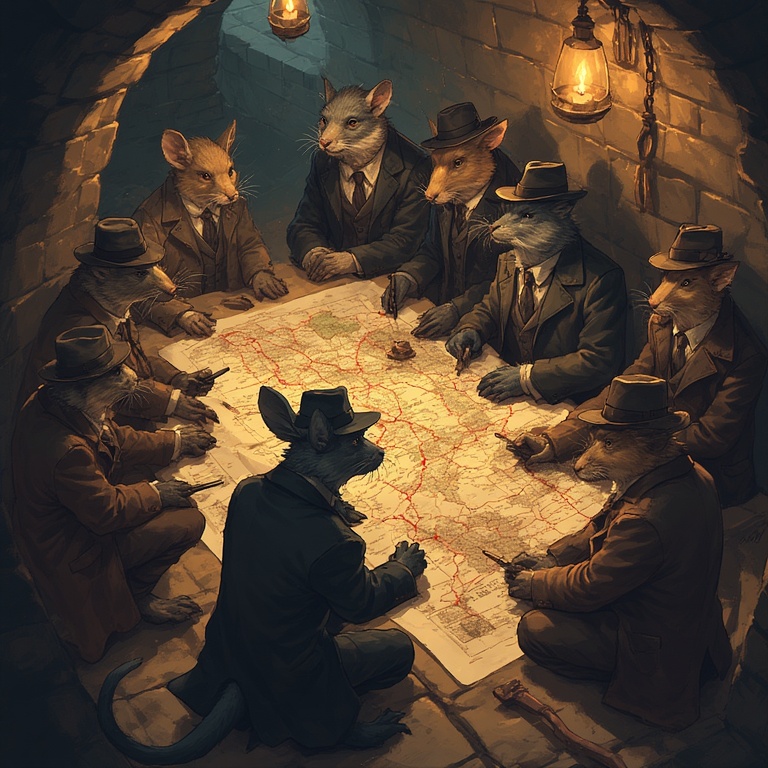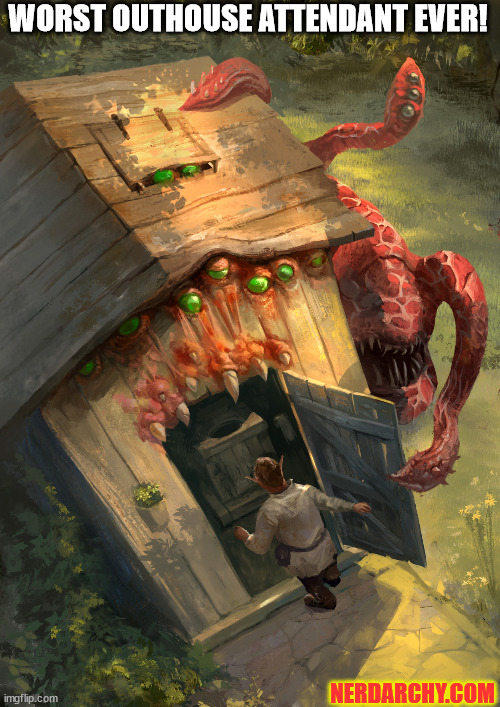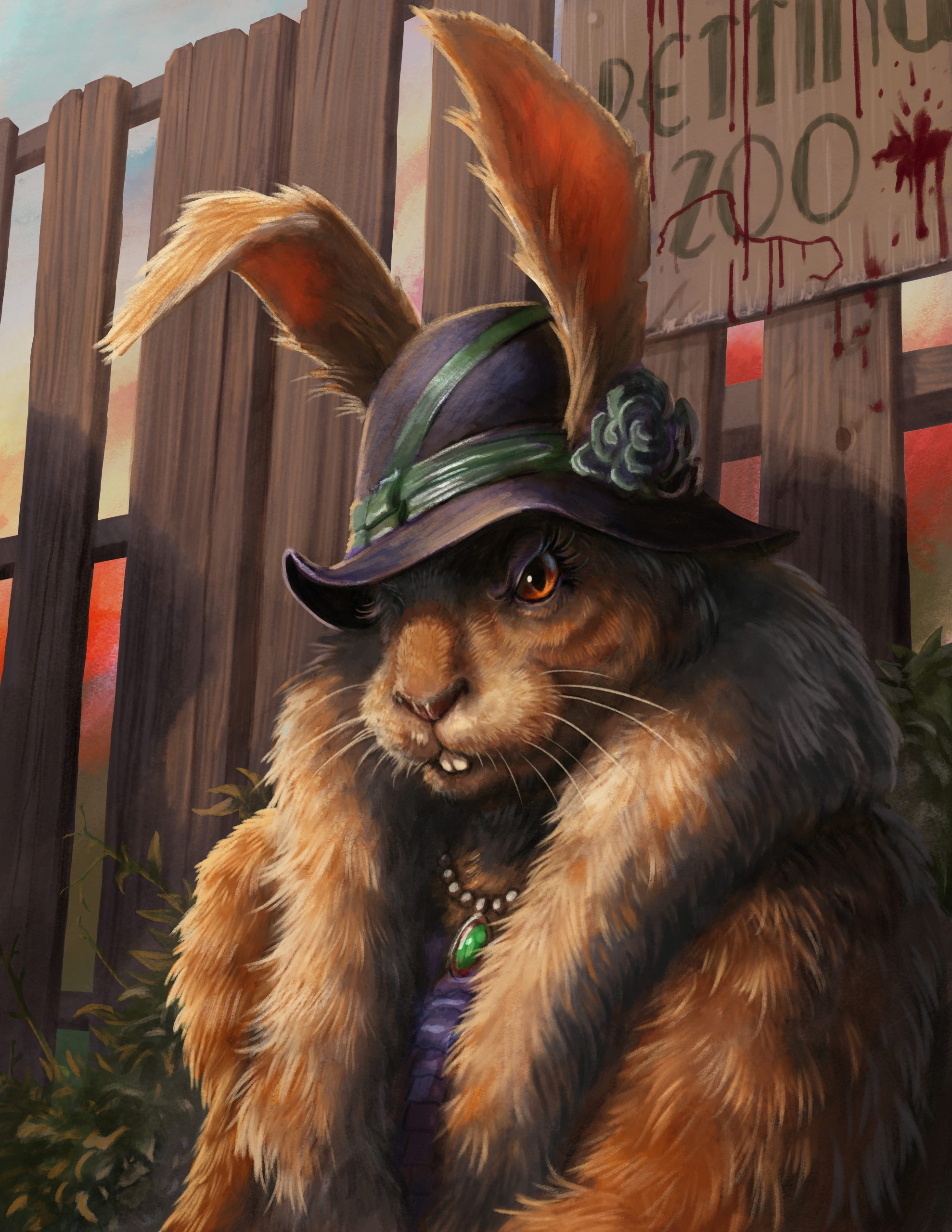
Passive Stealth and Other D&D skills – Making A Case
Not that long ago I moved back home to Salem (Oregon, not Massachusetts) from San Antonio (also not in Massachusetts). The other day I went to Dairy Queen, which I’ve been going to frequently, because for whatever reason Texans hate cherries, and I’m kinda making up for 15 years of not having my favorite treat, their cherry dip cone. After I approached the counter, I patiently waited for a cashier to notice me. Eventually one of them turned around, slightly startled at just seeing me there, without noticing me at all. The funny thing about that is, as I’ve become accustomed to, and what feels like a San Antonio tradition, I was wearing flip-flops. By all measures I shouldn’t be sneaking up on anyone, but apparently I have just a soft enough step and an unassuming presence that I can shift about unnoticed.
D&D Stealth and other skills in practice

Honestly, that kind of thing happens to me a lot. I rarely try to sneak up on people, but it happens. That doesn’t mean that I’m always successful, nor does that mean I’m guaranteed success when I’m actually trying to sneak up on someone. For whatever reason, this particular time got me thinking about the idea of a passive Stealth score. I’m a lot quieter, and a lot less assuming, than my sister, who (from my perspective) flails and stomps around. She’s anything but quiet, and tends to draw a lot of attention. I have literally never seen her be stealthy. She may have other strengths, but that’s not one of them. In fifth edition Dungeons & Dragons terms, she would not have proficiency in Dexterity (Stealth) – coincidentally, she’s not very dexterous, either – and I would probably give her disadvantage.
 This all got me thinking about what that would look like in D&D. Passive Stealth would work counterposed to passive Perception. Someone who has a high passive Stealth would blend into the crowd more naturally, and whose normal actions would go unnoticed by most people, except those with a higher passive Perception. Obviously, active attempts to hide or be aware are going to disrupt the natural order. Actively being cognizant of your surroundings is going to make you more aware of a person that naturally blends into the background, just like how a Stealth roll would be required if you’re actively trying to hide. However, adding passive Stealth to your D&D game means that the active or passive Perception roll would need to beat a passive Stealth score, unless you decide to hide if you notice that they’re looking for you. In that regard, bad rolls are essentially accidentally tipping your hand at either trying to be aware of your surroundings or trying to blend into them.
This all got me thinking about what that would look like in D&D. Passive Stealth would work counterposed to passive Perception. Someone who has a high passive Stealth would blend into the crowd more naturally, and whose normal actions would go unnoticed by most people, except those with a higher passive Perception. Obviously, active attempts to hide or be aware are going to disrupt the natural order. Actively being cognizant of your surroundings is going to make you more aware of a person that naturally blends into the background, just like how a Stealth roll would be required if you’re actively trying to hide. However, adding passive Stealth to your D&D game means that the active or passive Perception roll would need to beat a passive Stealth score, unless you decide to hide if you notice that they’re looking for you. In that regard, bad rolls are essentially accidentally tipping your hand at either trying to be aware of your surroundings or trying to blend into them.
That got me thinking about passive skills in D&D as a whole. The Observant feat offers a bonus to both passive Perception and passive Investigation scores (fifth edition D&D Player’s Handbook, p. 168). Although I’m not sure what a passive Investigation score would be for (I’m sure far more experienced D&D DMs would be better suited to answer that), that does mean that there is room for other forms of passive skills. Not all of them may be useful, but there’s a lot of flexibility in including passive skills.
 Intimidation is another prime example. There are some people who, by their mere presence, are intimidating. A passive Intimidation score for D&D wouldn’t necessarily work in that same way as passive Perception or Stealth, but a passive Intimidation score would affect all social interactions. People who are easily intimidated would be more inclined to submit to their will, where others may see it as a natural challenge of power, and some would not notice at all. Passive Performance would work on a similar principle, where the higher the score, the more people are naturally delighted and entertained by that character, and people are much more willing to listen to their stories. So, where a high passive Intimidation score would make people uncomfortable, a high passive Performance score, with their flourishes and delightful ways of speaking, would put people more at ease.
Intimidation is another prime example. There are some people who, by their mere presence, are intimidating. A passive Intimidation score for D&D wouldn’t necessarily work in that same way as passive Perception or Stealth, but a passive Intimidation score would affect all social interactions. People who are easily intimidated would be more inclined to submit to their will, where others may see it as a natural challenge of power, and some would not notice at all. Passive Performance would work on a similar principle, where the higher the score, the more people are naturally delighted and entertained by that character, and people are much more willing to listen to their stories. So, where a high passive Intimidation score would make people uncomfortable, a high passive Performance score, with their flourishes and delightful ways of speaking, would put people more at ease.
 Passive scores can have other uses, too. Knowledge checks can be circumvented with using Arcana, History, Nature, and Religion as passive skills. If a player is trying to recall something within the bounds of a passive knowledge skill check, then there’s no reason for them to have to roll for it, which saves a lot of time. That leaves knowledge skill rolls for more specific situations, like uncommon or archaic knowledge. It also makes the game feel more like real life. I have a decent knowledge of history. Enough to where I can pull a good amount off the top of my head without a second thought, but there’s still plenty that I’d have to think about, and hope I can trigger my memory.
Passive scores can have other uses, too. Knowledge checks can be circumvented with using Arcana, History, Nature, and Religion as passive skills. If a player is trying to recall something within the bounds of a passive knowledge skill check, then there’s no reason for them to have to roll for it, which saves a lot of time. That leaves knowledge skill rolls for more specific situations, like uncommon or archaic knowledge. It also makes the game feel more like real life. I have a decent knowledge of history. Enough to where I can pull a good amount off the top of my head without a second thought, but there’s still plenty that I’d have to think about, and hope I can trigger my memory.
Not everything can, though. Athletics, Acrobatics, Deception, Persuasion, and Sleight of Hand are all D&D skills that require active participation. Acrobatics is an active roll to ensure you maintain stability, or can perform a feat. As a passive skill, it would only feed into roleplay elements, describing the way with which a character would use their natural skills (or perhaps lack thereof) to perform specific light acrobatic functions, such as jumping over small fences, a thing that a DM may not call for a roll for, but something they can keep in mind for narration.
As players, we can use those passive skills to fuel our role playing. A high Survival score can be reflected as more naturally comfortable in the wilderness, being able to navigate the woods with ease, making the character less comfortable in urban environments. High Stealth skills can be those who prefer to be unassuming, or maybe they’re just not very notable, so they’re easy to miss. Passive skills scores can represent the way that the character generally is, where a roll would be what happens in a given moment.
I hope this article provides some inspiration, as much as I’ve been inspired.
Until then, stay nerdy!
[amazon_link asins=’B01LW6QSFX,0786966122,B06XW8R798′ template=’ProductCarousel’ store=’nerdarchy-20′ marketplace=’US’ link_id=’5679930f-5c26-11e7-9c66-b174b8c27902′]












Nigel "Nubz" Sanford
June 28, 2017 at 2:51 pmI agree on the use of passive skills and how some people have a natural talent for certain things. It reminds me of one place I worked. Wearing steel toe boots, being 6’2″ and 280+lbs, I should not be sneaking up on anyone. Yet I was sent a memo to wear my keys on my waist because no one could hear me coming, and a few people have heart conditions. My room mate’s brother recently informed me that he is naturally intimidated by me despite me being a goofball. So it definitely has merits.
That being said, I could see persuasion and deception bring passive too. Some people naturally are more persuasive or better liars. Some people are naturally better athletes too.
Final thought:
What if your natural passive social skills had an impact on people’s starting disposition to you?
David
August 25, 2017 at 6:30 pmYeah, I’m an almost 300lb ninja (not almost ninja, almost 300lb, I’m totally a ninja) and I can attest to very similar experiences.
Maybe in the same vein, some characters could have a passive Persuasion skill for beauty? People flock to beautiful people, who generally, if they don’t make complete fools of themselves, tend to get the things they want, or at least, easier than the fugglies. This might only happen for characters of the same race or body type, and perhaps those with lower charisma, those who don’t usually get to interact with beautiful people, have a higher chance at resisting?
Bensch
April 27, 2018 at 1:50 amfunny, I just recently have been thinking about the topic. although I came to the conclusion that theres too many variables involved.
passive perception is the easiest to implement. but as soon as competing skills appear, Id question what makes this work?
passive stealth would only work for you if you were amongst people looking similar (or people completely distracted from their surroundings; in my dnd world, smombies are no thing, however) your passive stealth would be dependent on your race, your specific looks, the way you dress, the way you walk,…
Passive Investigation btw is basically the same as passive perception, Id argue. Maybe a bit more about filtering useful info already. When perception lets you see the lake with ducks swimming on it and the trees around it waving in the wind, Investigation would have you notice that one duck is slightly bigger while the rest is a bit unnerved by its presence; that might be the wizard you search for!
Its a tough topic and thanks to you, I will be thinking about it all day now. xD
Doug Vehovec
April 27, 2018 at 11:34 amThank you for reading, and sharing your thoughts! If anything you find here on the site helps in a game, gives you an idea, makes you think, or simply provides an enjoyable read, I consider it a success 🙂
HFocus
June 10, 2021 at 11:53 amRouges have a class feature at 11th level called Reliable Talent, which adds an interesting dimension to this debate.
“By 11th level, you have refined your chosen skills until they approach perfection. Whenever you make an ability check that lets you add your proficiency bonus, you can treat a d20 roll of 9 or lower as a 10.”
Based on the most up to date version of the character sheet (DnD Beyond), the three sanctioned uses of passive skills are perception, investigation, and insight, which make sense, as each of these are sensory information that is always being processed unless the character is focused on something else, like navigation. If you fail this check, it won’t impede your ability to make another, just cost you an action. Meanwhile more actively used skills only need to fail once for them to fail entirely. You get spotted, you are no longer hidden. You fail your athletics check, you fall off the cliffside. Adventures sometimes add a bit of leeway by making a failure by 5 or less mean not making progress instead of outright failure, but given enough time a roll of 1 is inevitable.
One this that used to be more explicit was the concept of taking 10 or taking 20. If you are doing an initial look over a room for clues, a take 10 investigation would apply, but if you turn the room upside down and there is no penalty for failure, you take 20, the maximum amount of skill you could possibly display. In 5e this was replaced with passive skills and DMs can deduce that players will eventually roll that 20 when they take 10 turns breaking down a door, so it still technically exists. What follows naturally from that is the concept of taking 1, representing the worst roll a character could have. The rouge with a +6 to stealth will still have a stealth of 7 if they take 1, which can still be enough to succeed against the passive perception of someone with a +0 to perception if they are distracted or the rouge is lightly obscured.
This is why I propose a homerule that for success based skills like insight, investigation, and perception, passives should have a base of 10, while failure based skills like stealth, acrobatics, and athletics should have a base of 1. Then Reliable Talent has its place, while still allowing for a wider array of passive skills. If you want to be more forgiving with it, you could make the base for failure based skills a 5, the equivalent of imposing disadvantage.